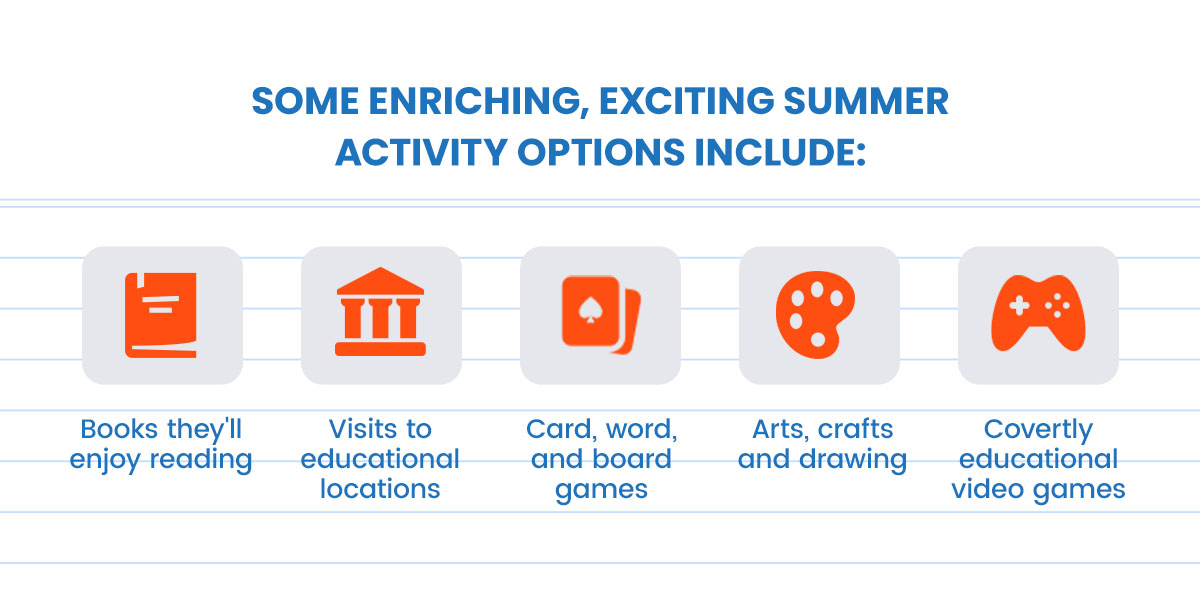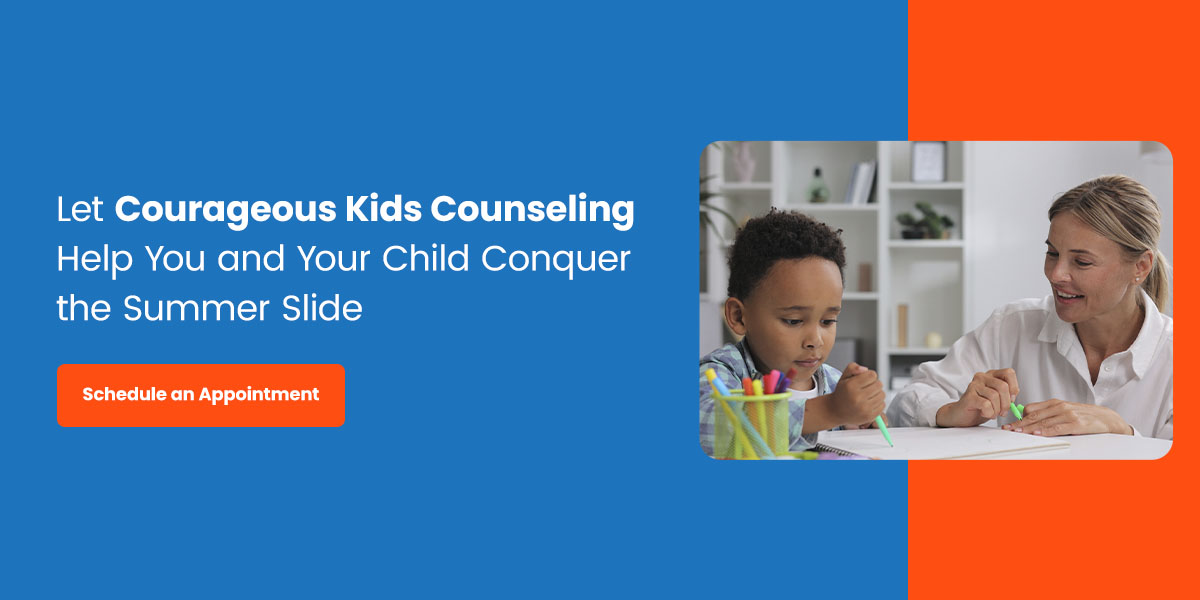Table of Contents
Child Regression in Summer: Parents’ Essential Guide
While children look forward to their well-deserved summer vacation, you may worry about how much schoolwork they’ll forget over the upcoming months — for good reason. The American Educational Research Association found that over half of students lose nearly 40% of their school-year knowledge after summer break due to the phenomenon known as summer regression, learning loss, the summer setback or the summer slide.
You can take steps to help your child or teen preserve the progress they’ve made at school while still enjoying a fun-filled, relaxing summer. Read on to find out how and why summer regression happens, tell-tale signs to look for in your child’s behavior and how to prevent valuable knowledge from melting away in the summer heat.
What Is Summer Regression?
Summer regression happens when children gradually lose academic progress, knowledge and skills over their summer break, leading to lower performance when they return to school. Students tend to experience the summer slide most significantly in technical subjects like mathematics and reading, which require consistent practice.
What Causes Regression Over Summer Months?
There are several reasons why your child might forget or lose competence in schoolwork they’ve previously mastered, including:
- Having less exposure to educational materials.
- Doing fewer mentally enriching activities.
- Not practicing critical skills for long periods.
- Being away from teachers and academic guidance.
- Losing confidence in their abilities over time.
- Breaking the everyday routine they’re used to.
What Are the Signs of Summer Regression?
Once your child or teen returns to school, you may notice differences in grades, attitudes toward learning, interest in club activities, self-confidence, peer relationships and emotional regulation. While some more severe changes could be warning signs of a more serious mental health concern, many of them come from three months of academic inactivity.
How Does the Summer Slide Impact Your Child and Family?
Academic regression can impact the whole family:
How Summer Setbacks Affect Your Child
Learning loss impacts your child more than anyone. When they see test results lower than they’re used to after summer break, their confidence and self-esteem could take a significant knock, and they may become discouraged about their potential to achieve their goals and keep up with their classmates. Their lower test scores could lead to fewer tertiary education opportunities or start a snowball effect that impacts their academic performance overall.
Academic Regression’s Impact on Parents
You care deeply about your child’s welfare and happiness, so the idea that they may have lost hard-earned knowledge, setting them back at school, can be distressing and frustrating. You may need to supplement their education with summer school or extra classes to keep them on track to graduate on time, costing you money and valuable time with your child. You may also need to change your other children’s routines to accommodate extra schooling.
How Can You Prevent and Manage Summer Regression?
You can help your child or teen retain crucial learned material over the summer with a few simple yet effective techniques:
1. Introduce Educational Activities
Introduce fun and exciting learning opportunities during the summer holidays. By no means do these activities need to be sitting down and writing a book report or calculating long division. The more subtle the learning opportunity, the better, so your child still feels like they’re having a break from school. Some enriching, exciting summer activity options include:

- Books they’ll enjoy reading: Pick three or four kid-friendly books you know your child will be interested in, or take them to the library or bookstore so they can pick their own.
- Visits to educational locations: Take a trip to the aquarium, planetarium, zoo or kid-friendly museum so they can read the fascinating information plaques and posters.
- Card, word, and board games: Monopoly and Rummikub are great for brushing up on basic math, and Scrabble, Codenames Family Edition and Pictionary support reading and vocabulary.
- Arts, crafts and drawing: Get creative with word collages, paper mache, comic drawing and treasure hunts with educational clues for some fun, enriching family bonding time.
- Covertly educational video games: Many fun video games, such as Magic School Bus, Kerbal Space Program and Minecraft, are secretly educational, making them perfect for rainy summer days.
2. Encourage Social Engagement
Summer camps, play dates, and other social activities are great ways to keep developmental momentum during the summer months. Your child could enjoy one of the above-mentioned educational activities with their peers to refresh and consolidate their knowledge or work on their communication, problem-solving and emotional control by playing in a group setting.
3. Maintain a Balanced Schedule
Routines are essential for mental health, especially if your child is neurodivergent. One of school’s nonacademic benefits is its reliance on a regular, predictable daily schedule. During summer, children are suddenly gifted with sprawling free time and little guidance on creating their own summer routines. To help your child avoid anxiety, make a summertime schedule, starting with a family meeting to review the day’s activities and goals.
Why Include Routine and Structure in Children’s Lives?
Routine encourages emotional stability and feelings of security because it structures children’s time, breaking it up into smaller, more manageable pieces. It also helps you and your child plan a balanced summer filled with family bonding, friends and enriching exercises. Other benefits of a summer schedule to minimize learning loss include:
- Consistent bedtimes and wake-up times for better sleep quality.
- Scheduling exciting activities after less-preferred activities as a reward.
- Making time blocks for fun and educational activities so they don’t miss out.
- Encouraging responsibility as children carry out daily scheduled tasks on their own.
Common Questions About Summer Learning Regression and Prevention
Below, we answer a few common questions that parents have about summer regression. If you still have concerns or are curious about how to support your child through summer, both academically and emotionally, learn more about therapy for kids or check out our informative blog on child mental health.
Is Summer Regression Normal?
Yes, summer regression in young people is normal but preventable. It results from how the human brain naturally processes and stores information over time. While practice keeps our skills and knowledge sharp, non-use can blunt them.
Who Is at Risk for Academic Regression?
All children who skip mentally enriching activities during their long vacation can experience the summer slide. Lower-income households are more at risk of summer regression because they don’t always have spare finances to fund educational toys, games, outings and books.
When Should You Seek Professional Child Behavior and Management Solutions?
If you’re struggling to find time, ideas or resources to make your child’s summer vacation more stable and educational, contact professional kids counselors for guidance and advice. If your child is showing any of the following signs of anxiety or depression during or after their summer break, reach out for support from child and family psychology experts:
- Frequent emotional distress
- Trouble falling or staying asleep
- Changes in appetite
- Enduring drop in academic performance
- Withdrawal from family and friends
- Loss of interest in favorite activities
- Increased aggression or defiance
With the right support from family and friends, educational resources and therapy, your child or teen can fully enjoy their summer and confidently return to school in the fall. At Courageous Kids Counseling, we give your child the compassion, understanding and coping tools they need to thrive. Our licensed child therapists take the time to get to know your child’s unique personality and connect with them on their level.
For help with post-summer academic or separation anxiety and depression, resolving family challenges or navigating attention deficit hyperactivity disorder, schedule a virtual appointment or an in-person session with Courageous Kids Counseling today.



